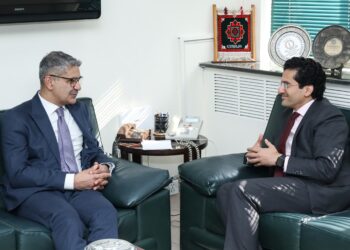ISLAMABAD — The National Electric Power Regulatory Authority (NEPRA) on Wednesday scolded representatives from the Power Division for what was described as disruptive and disorderly conduct during a hearing on a review petition challenging Rs 50.013 billion in write-off claims granted to K-Electric (KE).
“You are here to explain your case, despite admitting you lack authorization from the Federal Government. We will hear you out, but this is absolutely not the way to behave,” remarked NEPRA Member (Law), Amina Ahmed, addressing the Power Division’s delegation amid heated exchanges.
The Power Division was represented by Additional Secretary (Power Finance) Mehfooz Bhatti and Naveed Qaiser of the Pakistan Power Management Company (PPMC). KE’s team included Chief Financial Officer Aamir Ghaziani and Legal Counsel Ayan Memon. Public interveners Arif Bilwani, Rehan Jawed, and Tanveer Barry also submitted arguments aligned with their earlier written submissions.
During the proceedings, NEPRA Member (Technical) Rafique Ahmad Shaikh raised concerns over the Power Division’s failure to pay the mandatory fee required to file a review petition, calling it a basic legal prerequisite.
NEPRA had approved KE’s seven-year Multi-Year Tariff (MYT) from 2017 to 2023 in March 2017, with a 1.78% write-off allowance. A revised determination issued on July 5, 2018, introduced stricter requirements, including board-level approval, independent auditor verification, and additional compliance conditions.
Over time, KE submitted write-off claims alongside its quarterly adjustment petitions. Following multiple reviews, NEPRA issued a final determination in June 2025, allowing a total of Rs 50.013 billion in write-offs.
The Power Division has now challenged this determination, particularly questioning a GST component of Rs 6.619 billion. The Division maintains that, under the NEPRA Act and tariff rules, the GST element is not recoverable and should instead be addressed by the Federal Board of Revenue (FBR).
NEPRA Chairman Waseem Mukhtar dismissed this argument, citing Strategic Directive 31(a) of the National Electricity Plan 2023–27, and repeatedly pressed the Power Division to clarify its stance on the Rs 50 billion in write-offs.
However, Additional Secretary Bhatti deflected, stating, “We understand we are sitting in a responsible forum and expect NEPRA to give its determination on merit and protect consumer interests.” When the Chairman reiterated the question, Bhatti curtly concluded, “Power Division has filed a review as per NEPRA rules. Thank you very much.”
Later, Naveed Qaiser of PPMC conceded that any prudent portion of the write-off claims should be permitted as per the Consumer Service Manual (CSM).
The tense atmosphere prompted Member (Technical) Shaikh, who chaired the session, to raise serious concerns over the decorum.
“I cannot conduct the hearing under such disorder. Everyone is speaking without the Authority’s permission. Only NEPRA Members are allowed to intervene,” he said firmly.
Shaikh further criticized the dire state of the power sector, pointing out that it consumes 40% of Pakistan’s national budget. “Who are we fooling?” he asked, rhetorically.
KE’s CFO addressed concerns over tax-related components of the write-offs, explaining that under the Sales Tax Act, 1990 (prior to March 2023), all DISCOs were legally required to deposit sales tax on a billed basis—even for amounts not yet recovered from consumers. He clarified that while sales tax was included in KE’s write-off claims, income tax and other duties payable only upon actual recovery were not part of the claim.
KE’s Legal Counsel Ayan Memon asserted that all regulatory conditions for the write-offs had been strictly followed and independently verified. He rejected the Power Division’s review petition as legally non-maintainable.
KE argued that the Power Division does not qualify as a “party” under Regulation 3(1)(d) of NEPRA’s Review Procedure Regulations, 2009, which defines a party as someone directly involved in the tariff proceedings or admitted as an intervener.
“The Power Division neither participated in the original proceedings nor was admitted as an intervener. Therefore, it lacks the legal capacity to seek a review,” KE maintained.
KE further asserted that the review motion presented no new evidence or error apparent on the face of the record, which is required for review under Regulation 3(2). As such, KE argued, the
Among the interveners, Arif Bilwani opposed the approval of the write-offs in their current form, citing lack of transparency.
Rehan Jawed criticized the continuation of Debt Service Surcharge (DSS) at Rs 3.23/kWh, which he said would amount to Rs 1.225 trillion in subsidies. He argued that KE customers are unfairly being asked to bear the burden of circular debt caused by inefficiencies in other DISCOs.
“KE’s recovery efforts don’t contribute to the circular debt. Yet its consumers are being penalized through surcharges for failures in other parts of the system,” Jawed said.
Tanveer Barry supported NEPRA’s move to fix the control period of seven years—and eleven years for the BQPS-III plant—urging that it not be reversed. He also emphasized that KE must now secure a gas supply agreement with SSGC, as fuel availability is no longer an excuse for reduced capacity. Ends
Canadian Envoy meets Petroleum Minister
ISLAMABAD : Federal Minister for Petroleum Ali Pervaiz Malik held a meeting with the High Commissioner of Canada to Pakistan,...
Read more














